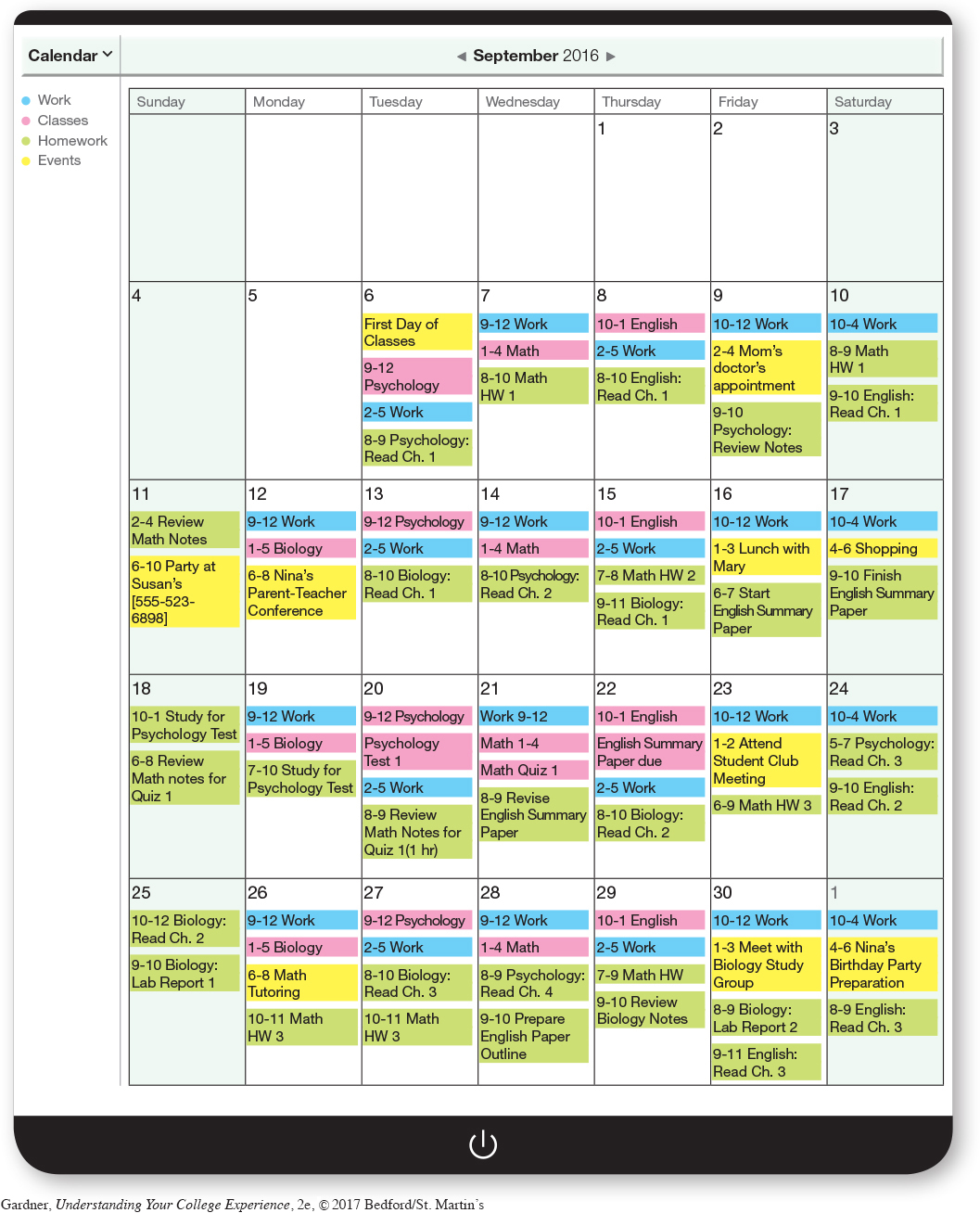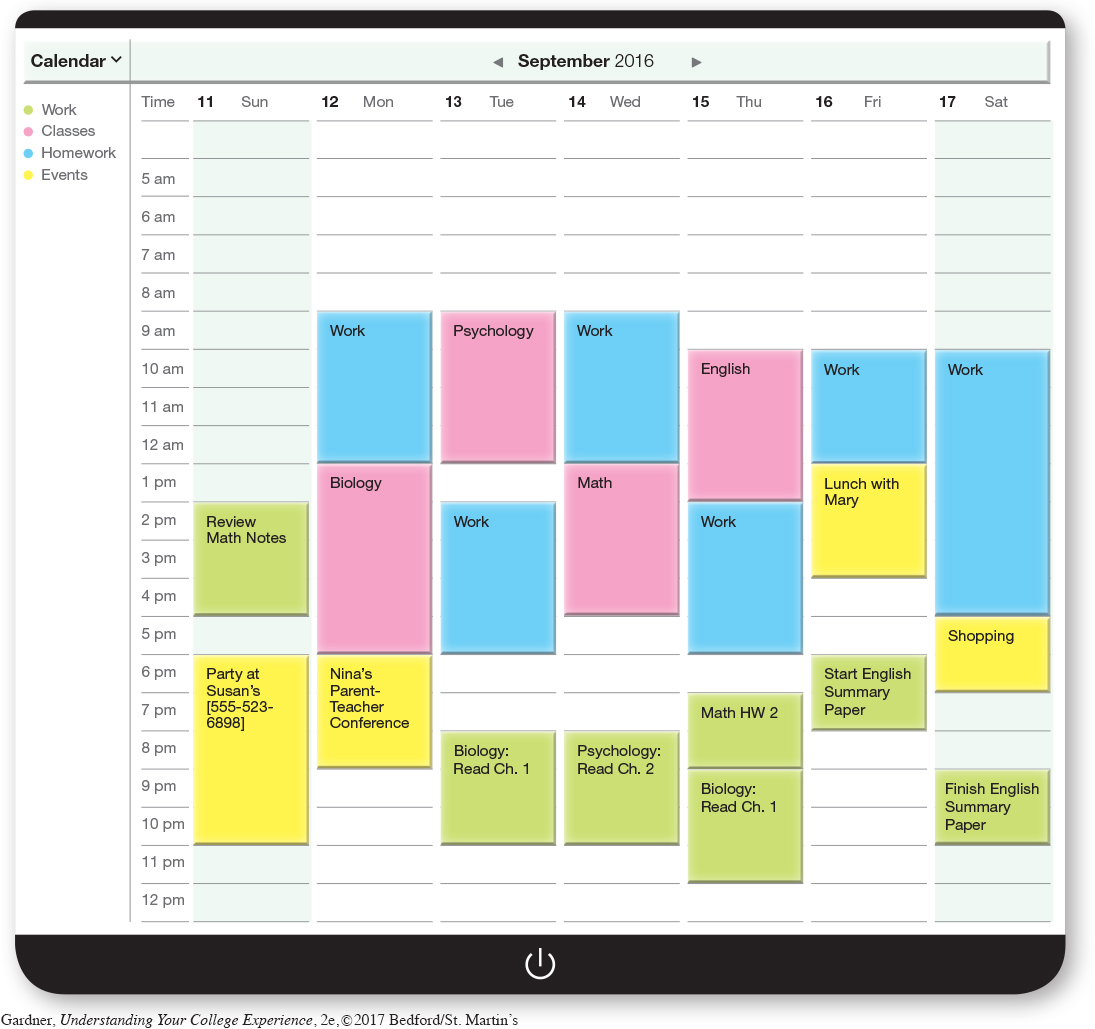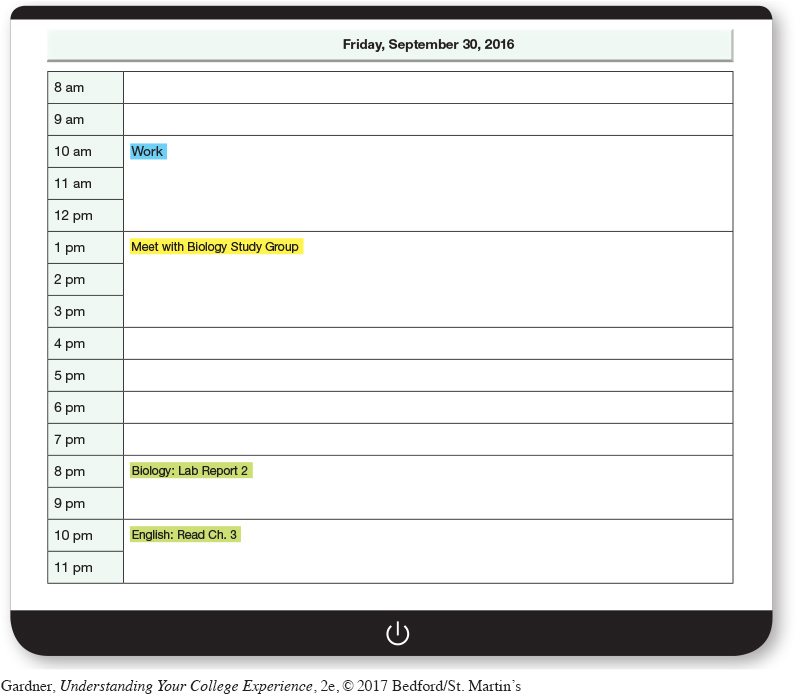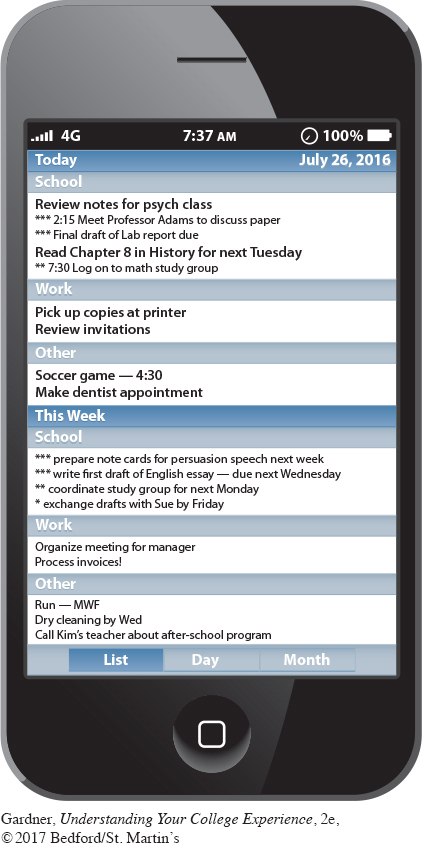3.1 MANAGING YOUR TIME
49
Different people approach time differently based on their personality and background. Some people are always on time while others are almost always late. In every class, some students enter all due dates for assignments on a calendar as soon as they receive each syllabus, and this is probably a predictor of greater success for these students. Other students take a more laid-back approach and prefer to go with the flow rather than follow a daily or weekly schedule. These students might deal well with the unexpected, but they also might leave everything to the last minute and not be as successful as they could be if they managed their time differently. Improving your organizational skills can help you do better at school, work, and life. Many college students have a lot of responsibilities in addition to attending classes and studying; they often work and have families to take care of. For these students in particular, more organization almost always leads to more success, so the time and energy they spend to get organized will pay off. In our interviews with highly successful college students, they report that their number one success strategy is time management. Think of it this way: If you were hiring someone for a job, wouldn’t you select an organized person who gets things done on time?
Taking Control of Your Time and Making Choices
The first step to effective time management is recognizing that you can be in control. The next time you find yourself saying, “I don’t have time,” stop and ask yourself whether this is actually true. Do you really not have time, or have you made a choice not to make time for a particular task or activity?
When we say we don’t have time, we imply that we don’t have a choice, but we actually do. We have control over how we use our time and how many commitments we make. We have control over what time we get up in the morning, how much sleep we get, and how much time we spend studying, working, and exercising. While these might seem like small decisions, they have a big cumulative impact on our success in college and in life.
How you manage your time reflects what you value and what consequences you are willing to accept when you make certain choices. If you value time with friends above all, your academic work likely takes a backseat to social activities. How you manage your time corresponds to how successful you will be in college and life. Almost all successful people use some sort of calendar or planner, either digitally or on paper, to help them keep up with their appointments, assignments, tasks, and other important activities. It would be very difficult to find a successful person—no matter what they are successful at doing—who does not use a calendar. Using your head as your only planner, trying to remember everything you have to do without recording it anywhere, means that you will probably forget important events and deadlines.
Planning the Academic Term
50
Getting a bird’s-eye view—or big picture—of each academic term will allow you to plan effectively. In preparing your calendar, first refer to your college academic calendar, which shows important dates that are specific to your campus: financial aid, registration, and add/drop deadlines; midterm and final exam dates; holidays; and graduation deadlines. Add important dates and deadlines to your calendar, such as when the registration starts and ends, when you need to pay for your courses, or when you should file your application for financial aid or scholarships. You may have received an academic calendar when you registered for classes; you can also find the academic calendar posted on your college website.
After adding these important dates, you should add deadlines for specific assignments, papers, and exams to your calendar. Remember that you have to keep track of important dates not only in your own life but also in the lives of those close to you—birthdays, doctors’ appointments, work schedules that may keep changing, travel, your children’s activities, visits from out-of-town guests, and so on. Different aspects of your life have different sorts of time requirements, and the goal is to stay on top of all of them.
You might prefer to use a digital calendar on your phone, tablet, laptop, or other devices. (See the Tech Tip at the end of this chapter for different options.) Regardless of the format you prefer, it’s a good idea to begin the academic term by reviewing your syllabus for each course and then completing a preview (Figure 3.1), recording all of your commitments for each day, and using different colors for each category:
Classes, tests, quizzes, and major assignment due dates (pink)
Homework and study time for each class you’re taking (green)
Work (blue)
Personal obligations, social activities, and other events (yellow)

Recording your daily commitments allows you to examine your toughest weeks each month and during the term. If research paper deadlines and test dates fall during the same week, find time to finish some assignments early to free up study time. If you use an electronic calendar, set reminders for these important deadlines and dates. If you are taking online courses, it is very important to understand that online course management systems do not allow late submissions. You must record the deadlines for submitting assignments and meet them all.
Overall, you should have monthly (Figure 3.1), weekly (Figure 3.2), and daily (Figure 3.3) views of your calendar. All three views are available when you use your digital devices to create them, but if you are using paper calendars, you can create monthly, weekly, and daily ones, too.


Once you complete your monthly templates, you can put them together to preview your entire academic term. Remember to provide details such as the number of hours you anticipate spending on each assignment or task.
51
52
As you create your schedule, try to reserve study time for each class and for each assignment. Not all assignments are equal. Estimate how much time you will need for each one, and begin your work well before the assignment is due. Considering that these are estimates, you may have to revise them as you get more familiar with the demands of each course and better understand the actual time required to complete readings and assignments.
53
A good time manager frequently finishes assignments before actual due dates to allow for emergencies. If you are also working on or off campus, reconsider how many hours per week it will be reasonable for you to work above and beyond this commitment and whether you need to reduce your credit load or other obligations. Although you might have to work to pay your tuition or cover living expenses, many college students work too many hours just to support a certain lifestyle. Remember that managing your time effectively requires practice. You may have to rearrange your schedule a few times, rethink some priorities, and try to use your time differently. The more you apply time-management skills, the more time you can save. This time becomes available for other activities you might rather pursue. In this sense, time management makes time.
Being a good student does not necessarily mean studying day and night and doing little else. Scheduling time for work and pleasure is important, too. After all, most students have to juggle a lot of responsibilities. You might have to work to help pay for school, and you probably want to spend time with family or friends to recharge your battery—you might even need to take care of loved ones. And you will need time for yourself to relax and unwind; that time should include getting some exercise, and maybe reading a book for pleasure, or seeing a movie. Notice that the daily planner (Figure 3.3) includes time for other activities as well as time for classes and studying.
54
When using a digital calendar, it’s a good idea to back up the calendar on iCloud or another online storage platform in case you lose your phone, experience a computer crash, or leave your charger at home. Carry your calendar with you in a place where you’re not likely to lose it. Checking your calendar regularly helps you keep track of commitments and maintain control of your schedule. This practice will become invaluable to you in your career. Check your calendar daily for the current week as well as the coming week. It takes just a moment to be certain that you aren’t forgetting something important, and it helps relieve stress. Consider setting regular times to check your calendar every day, perhaps right after eating breakfast or in the evening to see what’s coming in the days and weeks ahead.
Keep the following points in mind as you organize your day:
Set realistic goals for your study time. Assess how long it takes to read a chapter in different types of textbooks and how long it takes you to review your notes from different courses.
Use waiting, commuting, and travel time to review. Allow time to review your notes after each class and as soon as you can. You can review your notes if you have a break between classes or while you’re waiting for the bus or riding the train. If you have a long bus or train ride, consider formally budgeting this time in your planner, and use it wisely to study and review notes or listen to recorded notes. Make a habit of using waiting time, and soon you’ll do it without even thinking—it becomes bonus study time to help compensate for unexpected events that might pop up in your day and throw off your schedule.
Limit distracting and time-consuming communications. Check your phone, tablet, or computer for messages or updates at a set time, not whenever you think of it. Constant texting, browsing, or posting can keep you from achieving your academic goals. Particularly if you are taking online courses and need to be connected when studying, turn off all the notifications on your device to avoid being distracted. The notifications may tempt you to check messages or posts and waste valuable study time. Remember that when time has passed, you cannot get it back.
Avoid multitasking. Multitasking, or doing more than one thing at a time, requires that you divide your attention among the tasks. You might think that you are good at multitasking. Most college students assume that multitasking is a skill. However, the reality is (and research shows) that you can get tasks done faster and more accurately if you concentrate on one at a time.1 But don’t take our word for it: Try setting aside time in your schedule to focus on one important task at a time; you’ll probably find you do a better job on your assignment, test, or project and will remember more about the experience.
55
Be flexible. You cannot anticipate every disruption to your plans. Build extra time into your schedule so that unexpected events do not prevent you from meeting your goals. You need breaks in your schedule for relaxation, catching up with friends and family, or spending time in the cafeteria or campus center.
YOUR TURN > TRY IT

Use the following to map your schedule; include the most important tasks, exams, and assignment due dates for the current month. Later in the chapter you’ll be asked to prioritize what you write here.
| Month: | ||||||
| Sunday | Monday | Tuesday | Wednesday | Thursday | Friday | Saturday |
Completing Large Assignments
Many students think they can start and finish a large assignment, such as a major paper, in the two or three days just before the due date. Even if you set aside a couple of days to only work on a large project, you can hardly use the time efficiently to finish it without any preparation and planning. For instance, if you have to write a ten-page paper, you will find it almost impossible to choose a topic, research it to find relevant information, take notes, create an outline, write a first draft, proofread, and revise your paper all in two or three days. The processes of gathering information and writing about a topic not only take time but also require thinking about and understanding the information for proper use in the paper.
56
Break large assignments such as major papers into smaller steps with deadlines. For example, you can establish a deadline for yourself to choose a topic. Then you can spend time over the next few weeks to research your topic, take notes, and begin drafting your paper. Breaking a large project into smaller steps is something you will probably have to do for yourself. Most instructors won’t provide this level of detailed assistance for writing assignments during class time, but you can still meet with your instructors before or after class, during office hours, or online or seek help from the writing center tutors or your college librarians. Taking a step-by-step approach to your first few papers and projects will give you experience you can apply to your future coursework. It will also give you more control over how you are spending your time and energy and reduce your stress. Finally, talk to other successful students about how they have managed large projects.
Overcoming Procrastination
Procrastination is the habit of delaying something that needs your immediate attention. Putting things off can become a serious problem for college students. Students procrastinate for many reasons:
Lack of motivation. Some students who are uncertain about the value of college may not be willing to do assigned work, even if a failing grade is the result.
Fear of failure is common even among students who are highly motivated. Some students do not want to start a task because they feel they may not be successful at completing it and disappoint themselves, their parents, teachers, or peers.
Some assigned work may seem boring or irrelevant. Students who have been given busywork in the past may assume that completing assignments is useless.
Taking the Procrastination Self-Assessment will help give you a sense of whether or not procrastination is a problem for you. If procrastination is indeed a problem for you, use the following strategies for beating it:
Remind yourself of the possible consequences if you do not get down to work, and then get started. Also, remind yourself that simply not enjoying an assignment is not a good reason to put it off; it’s an excuse, not a valid reason.
Create a to-do list. Check off items as you get them done—this simple act can be gratifying and motivating in and of itself as you can visually track how much you accomplish. Use the list to focus on the things that aren’t getting done. Move them to the top of the next day’s list, and make up your mind to do them. Working from a list will also give you a feeling of accomplishment and the sense that you have taken control over the activity.
Break big jobs into smaller steps. Tackle short, easy-to-accomplish tasks first.
57
Avoid doing other things that might seem more fun, and promise yourself a reward for finishing the task, such as watching your favorite TV show or going out with friends. For completing larger tasks and assignments, give yourself bigger and better rewards.
Find a place to study that’s comfortable and doesn’t allow for distractions and interruptions.
Say “no” to friends and family members who want your attention; agree to spend time with them later, and schedule that time.
58
Shut off and put away all electronic devices during planned study sessions. If you need to use an electronic device for studying, turn off all social media and any other applications not part of your studying—and keep them off.
Be aware that it might be more difficult to stay on track in your online courses as there are few or no weekly meetings with the online instructors and classmates. Connecting with another student in your online course can help both of you stay focused and organized as many online courses have several deadlines for submitting assignments, projects, and posting comments.
Consider asking those living with you to help keep you on track. If they see that you are not studying when you should be, ask them to remind you to get back to the books. If you study in your room, close your door.
PROCRASTINATION SELF-ASSESSMENT
Rate each statement about your work and study habits using the following scale:
1 = Strongly Disagree
2 = Disagree
3 = Mildly Disagree
4 = Agree
5 = Strongly Agree
____I have a habit of putting off important tasks that I don’t enjoy doing.
____My standards are so high that I’m not usually satisfied enough with my work to turn it in on time.
____I spend more time planning what I’m going to do than actually doing it.
____The chaos in my study space makes it hard for me to get started.
____The people I live with distract me from doing my class work.
____I have more energy for a task if I wait until the last minute to do it.
____I enjoy the excitement of living on the edge.
____I have trouble prioritizing all my responsibilities.
____Having to meet a deadline makes me really nervous.
____My biggest problem is that I just don’t know how to get started.
Now, count up how many statements you rated as 4 (“agree”) or 5 (“strongly agree”):
If you responded that you “agree” or “strongly agree” with two questions or fewer, then you may procrastinate from time to time, but it may not be a major problem for you. Reading this chapter will help you continue to stay focused and avoid procrastination in the future.
If you responded that you “agree” or “strongly agree” with three to five questions, then you may be having difficulties with procrastination. Revisit the questions to which you answered “agree” or “strongly agree” and look in this chapter for strategies that specifically address these issues to help you overcome obstacles. You can get a handle on your procrastination!
If you responded that you “agree” or “strongly agree” with six or more questions, then you may be having a significant problem with procrastination, and it could interfere with your success in college if you do not make a change. Revisit the questions to which you answered “agree” or “strongly agree” and look in this chapter for strategies that specifically address these issues. Also, if you are concerned about your pattern of procrastination and you aren’t having success in dealing with it yourself, consider talking to a professional counselor in your campus counseling center. It’s free and confidential, and counselors have extensive experience working with students who have problems with procrastination.
If you find that the above ideas and strategies to overcome procrastination don’t motivate you to get to work, consider re-examining your purpose and priorities in terms of college. If you are not willing or able to stop procrastinating, maybe you are not ready to commit to academic priorities at this point in your life. Only you can decide, but an academic adviser or a counselor can help you sort it out. And remember that succeeding in your academic pursuits is one of the surest paths to increased success in life.
YOUR TURN > WORK TOGETHER

With two or three other students, discuss ways to avoid procrastination. What works for you? Share examples from your experiences.
Setting Priorities
To stop procrastinating, think about how to prioritize, which means putting your tasks, goals, and values in order of importance (in the section on Managing Your Energy later in this chapter, we’ll discuss strategies to avoid becoming overextended. This goes hand in hand with setting priorities). Ask yourself which goals are most important but also which ones are most urgent. For example, studying in order to get a good grade on tomorrow’s test may have to take priority over attending a job fair today, or completing an assignment that is due tomorrow may have to take priority over driving your friend somewhere.
However, don’t ignore long-term goals in order to meet short-term goals. With good time management, you can study during the week prior to the test so that you can attend the job fair the day before. Skilled time managers often establish priorities by maintaining a to-do list on which they rank the items to determine schedules and deadlines for each task.
Once you have entered your future commitments in a term planner and decided how your time will be spent each week, create your to-do list, which is especially handy for last-minute reminders. A to-do list helps you keep track of errands to run, appointments to make, and anything else you might forget. You can keep this list on your cell phone or tablet, in a notebook, or on your bulletin board. Use your to-do list to keep track of all the tasks you need to remember, not just academics. Consider developing a system for prioritizing the items on your list: using different colors for different groups of tasks; highlighting the most important assignments; marking items with one, two, or three stars; or adding letters A, B, C, and so on to indicate what is most important (see Figure 3.4). Cross each task off your list as you complete it. You might be surprised by how much you can accomplish and how good you feel about it.

59
YOUR TURN > DISCUSS IT

Review the calendar for this month that you mapped out earlier in this chapter, and use letters, numbers, or colors to prioritize your tasks. What are your most important obligations, other than your studies, that will have to fit into your time-management plan? Are any of them more important to you than doing well in college? Why or why not? Discuss your thoughts on these questions in a small group.
60
Finding a Balance. Another aspect of setting priorities while in college is finding a way to balance your academic schedule with the rest of your life. Social and extracurricular activities (e.g., participating in a club, writing for the college newspaper, attending lectures) are important parts of the college experience. Time spent alone and time spent thinking are also essential to your overall well-being.
For many students, the greatest challenge of prioritizing will be balancing college with work and family obligations that are equally important and are not optional. Advance planning will help you meet these challenges. You should also talk with your family members and your employer to make sure that they understand your academic responsibilities. For example, you may be able to take a day off from work to prepare yourself for the final exam for a challenging course. But keep in mind that your employer may not give you flexibility in your work schedule, so you should plan ahead. Most instructors will work with you when conflicts arise, but if you have problems that can’t be resolved easily, be sure to seek support from your college’s counseling center. The counselors will understand your challenges and help you prioritize your many responsibilities.
Staying Focused. Many students of all ages question their decision to attend college and sometimes feel overwhelmed by the additional responsibilities it brings. Some first-year students, especially recent high school graduates, might temporarily forget their main purposes for coming to college and spend their first term engaging in a wide array of new experiences.
Allowing yourself a little time to adjust to college is OK within limits, but you don’t want to spend the next four or five years trying to make up for poor decisions made early in your college career, such as skipping class and not taking your assignments seriously. Such decisions can lead to a low GPA and the threat of academic probation or, worse, academic dismissal. Keep in mind that your grades will forever remain on your college transcript. If you plan to transfer to another higher education institution, you must send your transcript with your transfer application, and some employers might ask for a copy when you apply for a job.
A great way to focus (and to keep your priorities on track) is to finish what needs to be done before you move from work to pleasure. From time to time, you might have competing responsibilities; for example, you might have to work additional hours when you have an exam. In cases like these, talk to the people involved, including your instructors, to see how you can manage the conflict.
Appreciating the Value of Time
Think of the last time you made an appointment with someone who either forgot the appointment entirely or was very late. How did you feel? Were you upset or disappointed because the person wasted your time? Most of us have experienced the frustration of having someone else disrespect our time. In college, if you repeatedly arrive late for class or leave early, you are breaking the basic rules of politeness and showing a lack of respect for your instructors and your classmates.
61

Punctuality, or being on time, is expected in college, at work, and elsewhere in our society. Being strictly on time may be a difficult adjustment for you if you grew up in a home or culture that is more flexible in its approach to time, but it is important to recognize the value of punctuality. Although you should not have to alter your cultural identity to succeed in college, you must be aware of and meet the expectations that instructors typically have for students.
Here are a few basic guidelines for respectful behavior in class and in other interactions with instructors:
Be in class on time. This means getting enough sleep at night and waking up at a time that allows you to arrive in class early enough to take off your coat, shuffle through your backpack, and have your completed assignments and notebooks ready to go. Make transportation plans in advance (and have a backup plan). There might be consequences for being late to class. Some professors may penalize you and not accept any excuses. Check the syllabus for the instructor’s attendance policy.
Be on time for all scheduled appointments.
Avoid behaviors that show a lack of respect for both the instructor and other students, such as answering your cell phone during class, unless it is a legitimate emergency. Similarly, texting, doing homework for another class, falling asleep, talking (even whispering) during a lecture, or even wearing caps or hats in class are all considered rude by some instructors.
Not only is time management important for you, but it is also a way in which you show respect for your coworkers, friends, family, and college instructors—and yourself.
62
YOUR TURN > TRY IT

List your current priorities in order of importance. What does your list say about you and your values? Why do you consider some things more important? Less important? As you review your list, think about whether you have put any items in the wrong place. What should you change, and why?
| More Important | Important | Less Important | Not Important |
| 1. | 1. | 1. | 1. |
| 2. | 2. | 2. | 2. |
| 3. | 3. | 3. | 3. |
| 4. | 4. | 4. | 4. |
| 5. | 5. | 5. | 5. |